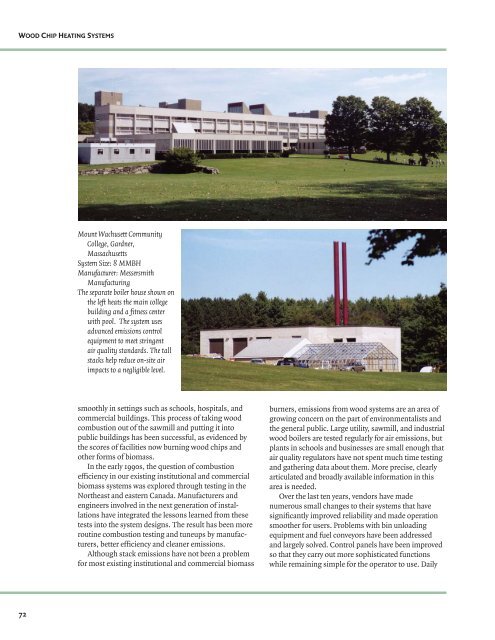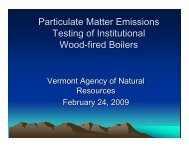Wood-Chip Heating Systems - Biomass Energy Resource Center
Wood-Chip Heating Systems - Biomass Energy Resource Center
Wood-Chip Heating Systems - Biomass Energy Resource Center
Create successful ePaper yourself
Turn your PDF publications into a flip-book with our unique Google optimized e-Paper software.
WOOD CHIP HEATING SYSTEMS<br />
72<br />
Mount Wachusett Community<br />
College, Gardner,<br />
Massachusetts<br />
System Size: 8 MMBH<br />
Manufacturer: Messersmith<br />
Manufacturing<br />
The separate boiler house shown on<br />
the left heats the main college<br />
building and a fi tness center<br />
with pool. The system uses<br />
advanced emissions control<br />
equipment to meet stringent<br />
air quality standards. The tall<br />
stacks help reduce on-site air<br />
impacts to a negligible level.<br />
smoothly in settings such as schools, hospitals, and<br />
commercial buildings. This process of taking wood<br />
combustion out of the sawmill and putting it into<br />
public buildings has been successful, as evidenced by<br />
the scores of facilities now burning wood chips and<br />
other forms of biomass.<br />
In the early 1990s, the question of combustion<br />
effi ciency in our existing institutional and commercial<br />
biomass systems was explored through testing in the<br />
Northeast and eastern Canada. Manufacturers and<br />
engineers involved in the next generation of installations<br />
have integrated the lessons learned from these<br />
tests into the system designs. The result has been more<br />
routine combustion testing and tuneups by manufacturers,<br />
better effi ciency and cleaner emissions.<br />
Although stack emissions have not been a problem<br />
for most existing institutional and commercial biomass<br />
burners, emissions from wood systems are an area of<br />
growing concern on the part of environmentalists and<br />
the general public. Large utility, sawmill, and industrial<br />
wood boilers are tested regularly for air emissions, but<br />
plants in schools and businesses are small enough that<br />
air quality regulators have not spent much time testing<br />
and gathering data about them. More precise, clearly<br />
articulated and broadly available information in this<br />
area is needed.<br />
Over the last ten years, vendors have made<br />
numerous small changes to their systems that have<br />
signifi cantly improved reliability and made operation<br />
smoother for users. Problems with bin unloading<br />
equipment and fuel conveyors have been addressed<br />
and largely solved. Control panels have been improved<br />
so that they carry out more sophisticated functions<br />
while remaining simple for the operator to use. Daily





